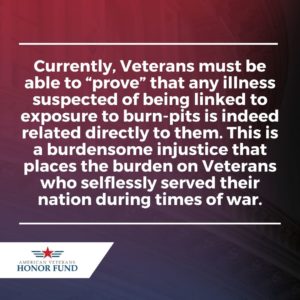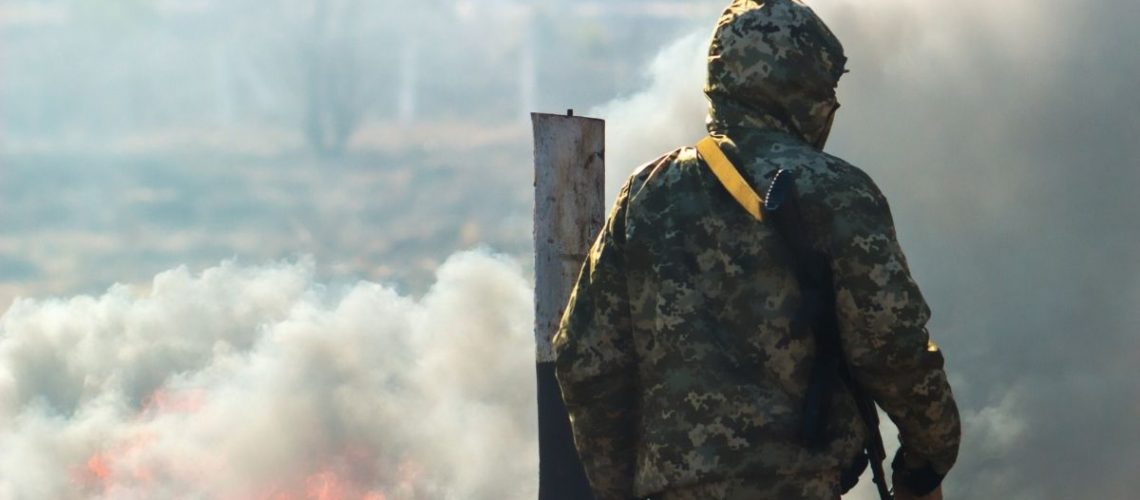Like millions of other Veterans across the United States, Retired Staff Sergeant, Wesley Black, depends on the Veterans Affairs medical system for their care. When Black first went to a VA reporting blood in his stool, he was told he was just suffering from irritable bowel syndrome. Now, Staff Sergeant Black at just 35 years old is battling Stage-4 Colon Cancer.
“Every night I put my son to bed. I wonder if that’s the last time I’m ever going to kiss him goodnight,” Black told WTOC 11 local news in July.
Black, who deployed in both Afghanistan and Iraq, is one of countless American Veterans who have been exposed to toxic burn-pits while deployed abroad in America’s foreign wars. But as noted by WTOC 11, the Pentagon has been slow to determine if there is a link to illnesses like the cancer suffered by Black and burn-pits used in combat zones to burn refuse in the name of protecting sensitive information.
While the Pentagon maintains further study is needed, the VA tacitly acknowledges that toxic burn-pits may be a direct link to many service-related illnesses suffered by Veterans:

“VA understands that many Veterans are especially concerned about exposure to the smoke and fumes generated by open burn pits.
In Iraq, Afghanistan, and other areas of the Southwest Asia theater of military operations, open-air combustion of trash and other waste in burn pits was a common practice. The Department of Defense has now closed out most burn pits and is planning to close the remainder.”
Unless immediate action is taken, more Veterans will needlessly perish, and their families destroyed by financial ruin brought on by uncovered medical bills.
This is why recent bipartisan legislation introduced by Congress is so important.
Bill to Provide Medical Care to Veterans Exposed to Burn Pits Introduced by California Democrat
In April of this year, California Democratic Congressman, Raul Ruiz, introduced the Presumptive Benefits for War Fighters Exposed to Burn Pits and Other Toxins Act. The bill was co-sponsored by Representative Brian Fitzpatrick in the House, and by Kirsten Gillibrand (D) and Marco Rubio (R) in the Senate.
Currently, Veterans must be able to “prove” that any illness suspected of being linked to exposure to burn pits is indeed related directly to them. This is a burdensome injustice that places the burden on Veterans who selflessly served their nation during times of war.
Representative Ruiz, a physician, understands that this must change immediately:
“Service members are returning home from the battlefield only to become delayed casualties of war, dying years later from lung diseases, cancers, and autoimmune diseases caused by their exposure to toxic military burn pits. The VA and DoD cannot continue to neglect this self-inflicted wound on our veterans.”
Senator Gillibrand also understands the urgency of passing this legislation:
“More than three million service members could have been exposed to toxic burn pits, yet the VA continues to deny them care by placing the burden of proof on veterans suffering from rare cancers, lung diseases, and respiratory illnesses. Congress cannot sit by as the VA ignores its duty.”
It is essential that this legislation is passed, and with its broad bipartisan, bi-cameral support there is no excuse not to get it done.
Presumptive coverage would extend to the following conditions:
“…asthma that was diagnosed after service, head cancer, neck cancer, respiratory cancer, gastrointestinal cancer, reproductive cancer, lymphoma cancer, lymphomatic cancer, kidney cancer, brain cancer, pancreatic cancer, melanoma, chronic bronchitis, chronic obstructive pulmonary disease, constrictive bronchiolitis or obliterative bronchiolitis, emphysema, granulomatous disease, interstitial lung disease, pleuritis, pulmonary fibrosis, sarcoidosis.”
This legislation would eliminate the outrageous and callous burden of proof and would require that Veterans simply submit documentation proving they received campaign medals associated with The Global War on Terror or The Gulf War and that they suffer from a qualifying condition.
This bill has yet to be passed. It is now incumbent on Congress to do the right thing for the Veterans they are responsible for sending to war. Until the day something is done to address this growing problem, each case like that of Staff Sergeant Wesley Black is a shameful tragedy that could have been avoided.
Veterans who enter Congress have the shared experience and sacrifice of serving their country to preserve our shared Constitutional Rights. Politicians who have served are more likely to reach across party lines to get things done for the American people. The House of Representatives has come together to pass at least ten bills addressing Veterans issues on a bipartisan basis. Here are the overview of five of these proposed bills which have been passed by the House and await Senate approval.


